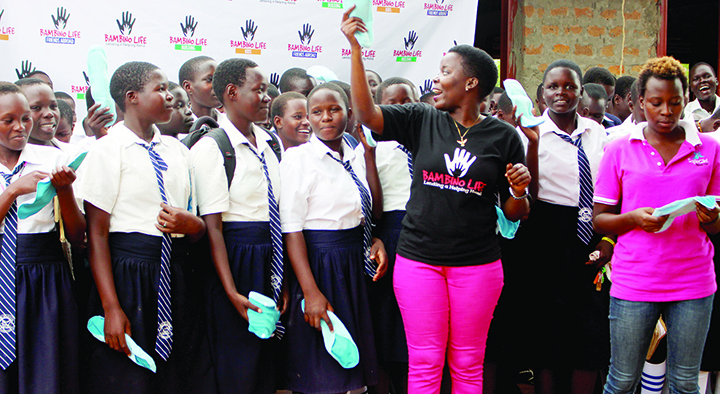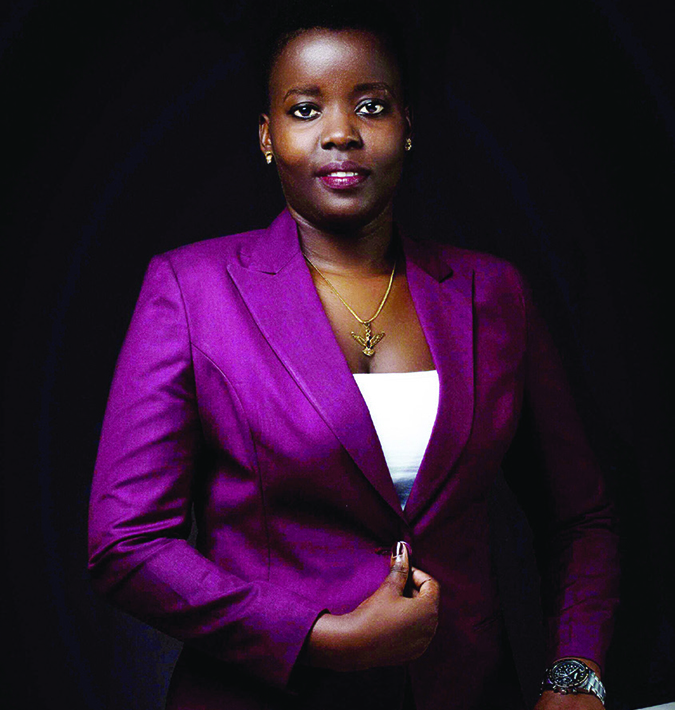From arts student to pilot
“I did not know female pilots existed until I saw a girl flying on my third day at school. I was determined to be like her,” she recalls.
Growing up, it never crossed her mind that she would fly an airplane.
It was nowhere in her dreams or line of prayer because she had no idea female pilots existed anyway.
Even if she wanted to pursue the profession, her mother, a low-income earner could not afford the tuition fees.
Besides flying, Faridah Ashaba is a brand; a public speaker invited around the world to inspire people.
She has spoken in South Africa at the Witwatersrand University, Dubai, the US, UK, Kigali and Tanzania, among others.
She has also featured in a women's magazine in Australia and has been hosted on popular TV shows in Philadelphia, New York, Ghana and more.
Right now as a pilot, she has been recognised more abroad than at home. She shared her story.

There are a handful of female pilots in Uganda and Faridah Ashaba is one of them.
One may think she comes from an affluent family; bred and schooled abroad. No, thank you! The 30-year-old was born and groomed in Makindye, a suburb of Kampala.
She experienced first-hand what it means to come from a humble background.
In education, Ashaba excelled in arts subjects. At A'level she passed history, economics, geography and fine art.
"Since childhood, I have known where I come from. I hate stressing my mother. So, I dreamt and lived within my means," she says.
Ashaba envisioned being a chef exploring local dishes and international cuisines or becoming an interior designer because she loves to beautify places.
However, in a remarkable turn of events, her dreams and life changed. Now she lives in a different world.
In 2019, she became the only African and youngest of nine women innovators of the world selected by the UN Women to feature in the Impossible to Ignore campaign that was displayed on media platforms worldwide.
Her face and name were plastered all over New York Times Square, Westfield world trade centre, The Economist, NASDAQ with over five million impressions on International Women's Day.
"I could not believe I was featuring alongside powerful women like Dr Christy Johnson, the first female African American deputy director at The National Aeronautics and Space Administration (NASA), among others," she says.
During her TEDx talk in Kigali Rwanda, hosted by the European Union, Ashaba emphasised that girls should focus on who they want to become, instead of what the society expects of them.
Braving a difficult childhood
"My success is hinged on my mother who single-handedly raised me and my brother who is at university," she says.
Their father was absent in their lives, but their mother did not give up.

She instead broke her back for her children and saw them through school.
She vended snacks and with her proceeds, built them a home.
She also educated her children alongside numerous dependants, who for years were under her care.
"We lacked many things and we were often sent away from school over fees," she recalls before adding that the hard situation pushed her to start fending for herself as a child.
Her mum would pack plantain and Irish potato crisps and Ashaba would sell them at her school to raise transport and pocket money.
Through all the hard times, Ashaba gives credit to her mum for being there for them. "I owe her a lot," she says.
Joining flying school
One wonders how an art student enrolled at a flying school, not to be an air hostess, but to fly an airplane.
"Being a pilot is more about practical work and training. The more you practise, the more you perfect your skill. It is like driving a car. You do not need to have passed sciences to drive it," she explains.
"Being good at mathematics is to one's advantage as one finds reading things like time and degrees easy," she shares.
Ashaba was also armed with geography. This helped her grasp aspects such as map reading easily.
During her Senior Six vacation as she was waiting to join university, one of Ashaba's uncles advised her mother to enrol her at the East African Civil Aviation Academy (Soroti Flying School) for a diploma in flight operations and management. It is a one-year course.
"Mum had fears about the finances required and we had no information about the course, but my uncle told us it was more affordable than the pilot course," Ashaba recalls.
The whole course required sh7m, whereas the pilot training would cost about $18,000 (sh67m).
After she was admitted, her mother drained her savings, borrowed left and right before she could start school in March 2011.
There were only 11 students, the majority (97%) male.
"I fell in love with aviation the moment I joined that school. That life was a world away from my usual. Everything is to international standards," Ashaba recalls.
She was given a well-furnished room in addition to good meals plus laundry services, among others.
Generally, life was so good she had to give it her best. There was no excuse to fail.
"I did not know female pilots existed until I saw a girl flying on my third day at school. I was determined to be like her," she recalls.
But when she talked to the girls, they were just like her. They did not have any superpowers. That inspired her a lot.
However, she would not be able to fly because she was doing a different course.
She had to enrol for a piloting course. This would only be possible with a scholarship and this was a huge mountain for her to climb. Nevertheless, she kept her hope alive.
"I completed the course on time and embarked on pursuing my dream of flying," Ashaba recollects.
There was an opportunity for government scholarships, but winning one was difficult.
"I pursued that scholarship for two years moving between Soroti and Kampala countless times," she reminisces.
"Whenever I heard that the President would be in Soroti, I would travel there. He lands at the school airfield and on many occasions, he speaks to the students. It is there that they get a chance to ask for assistance."
But every time a list came out, Ashaba's name was missing. She prayed and fasted and waited.
"Mum was even fleeced of money by a man who promised to take me to meet the President. It was heartbreaking for us," she shares.
Ashaba had declined a job offer as she waited for the scholarship. But everything seemed to be hitting a dead end.
Then one day, when she had given up, Lady Luck smiled at her, broadly. The year was 2013.
She heard of a pending visit by the President, asked her mother for money (after assuring her that it would be the last time) and set off. However, on reaching the bus park, all buses had left.
"I remember jumping on a newspaper van. It was slow and uncomfortable," Ashaba narrates.
But this time around, she got to meet the President.
"I was the only girl among over 20 male students. When the President told us to write our names I just grabbed the paper and my name was the first on the list," she recalls adding that she did not want to take any more chances.
Indeed, she got the scholarship.
"The first time I flew a plane on my own is one of my proudest moments in life," she reveals.
Today, Ashaba has a commercial licence that permits her to fly passengers.
"In piloting you have to keep adding on to your credentials. I am done with the multi-engine rating which allows one to fly planes with more than one engine and finishing up instrument rating. Going from the first officer to being a Captain someday is something I look forward to," she envisions.
Plans
"I want to do this job for a few years and retire. It is very demanding. Pilots spend months away from home."
During a recent conference for international female pilots, she engaged with older pilots who did not have a chance to start families because they were focused on career.
Heart for vulnerable children
Ashaba founded Bambino Life Foundation, where she promotes girls' education and empowerment. Bambino is an Italian word for ‘baby'.
She also creates awareness about children living with disabilities.
Braving a male-dominated world
In 2018, she became the director of STEM Queens Uganda, an initiative that encourages young girls to take on science, technology, engineering and mathematics.
She strives to see girls step into the male-dominated world with confidence.
Achievements, challenges
"This profession comes with a lot of recognition and favour. It has also boosted my confidence," she says.
Ashaba feels unlimited when it comes to doing a lot of things. It also boosted her sense of responsibility because she handles people's lives.
"You shift from thinking about yourself to the passengers. You have it in mind that your mistakes can cause loss of lives," she states.
Challenges
Some people water down her achievements, saying that she has enjoyed the soft side of life because she comes from western Uganda. But the reverse is true.
"I labour to educate people that not every westerner is privileged. Many of us have toiled for our achievements," she says.
Ashaba has also been faced with gender bias challenges.
"There are people who think that some of us have slept our way to the top. This is absurd because many girls are smart and hardworking. Besides, piloting is a practical vocation. It is impossible to bribe," she says.
"Relationships have not been an easy ride either. Some guys get close not for love, but just to sleep with a pilot," she notes.
However, Ashaba is cautious on boundaries and keeps men at a distance.
"I tried dating someone, but he was intimidated," she says. He always put her down and was not positive about her career.
"I will settle down in future with the right person from God."